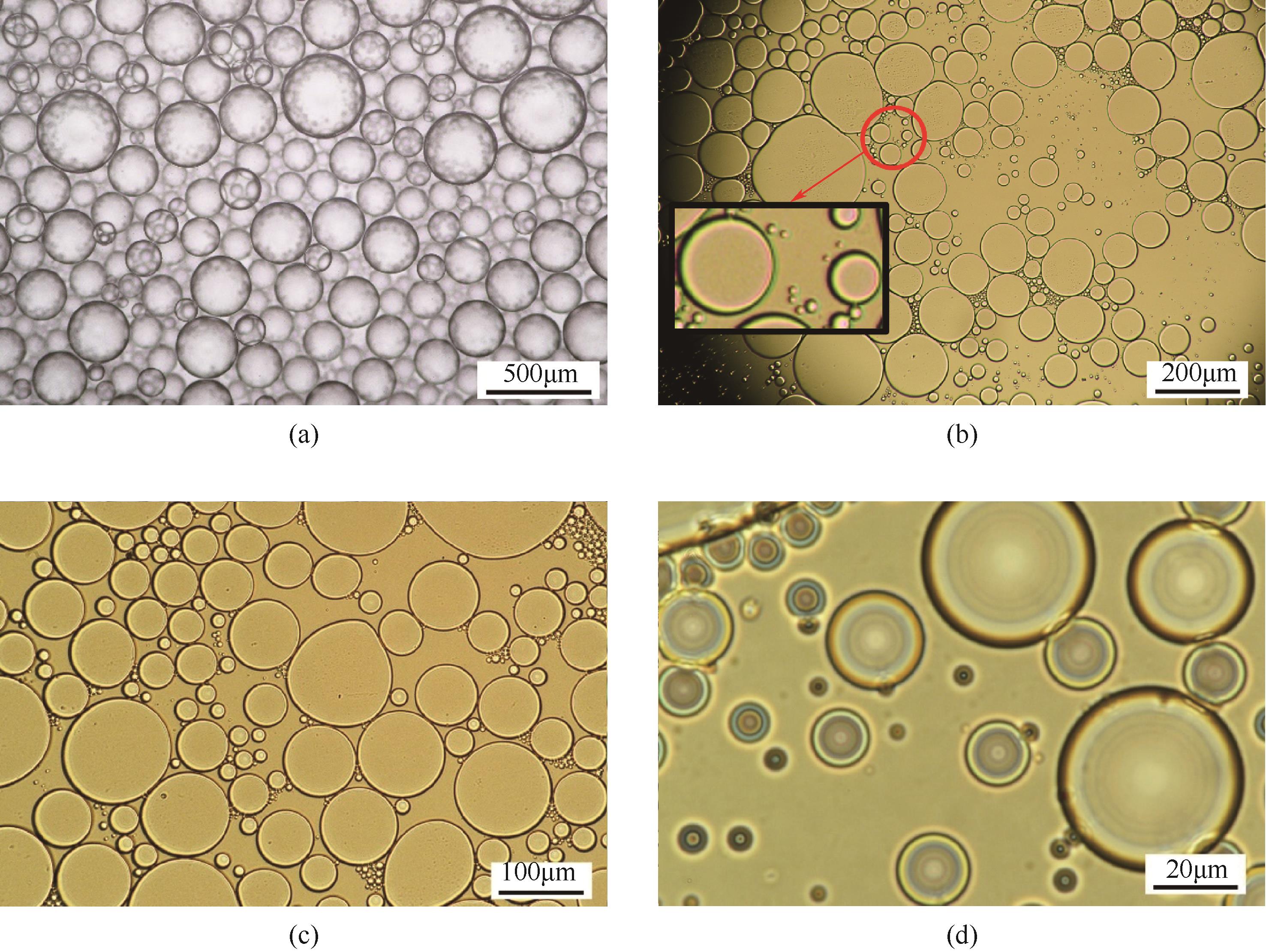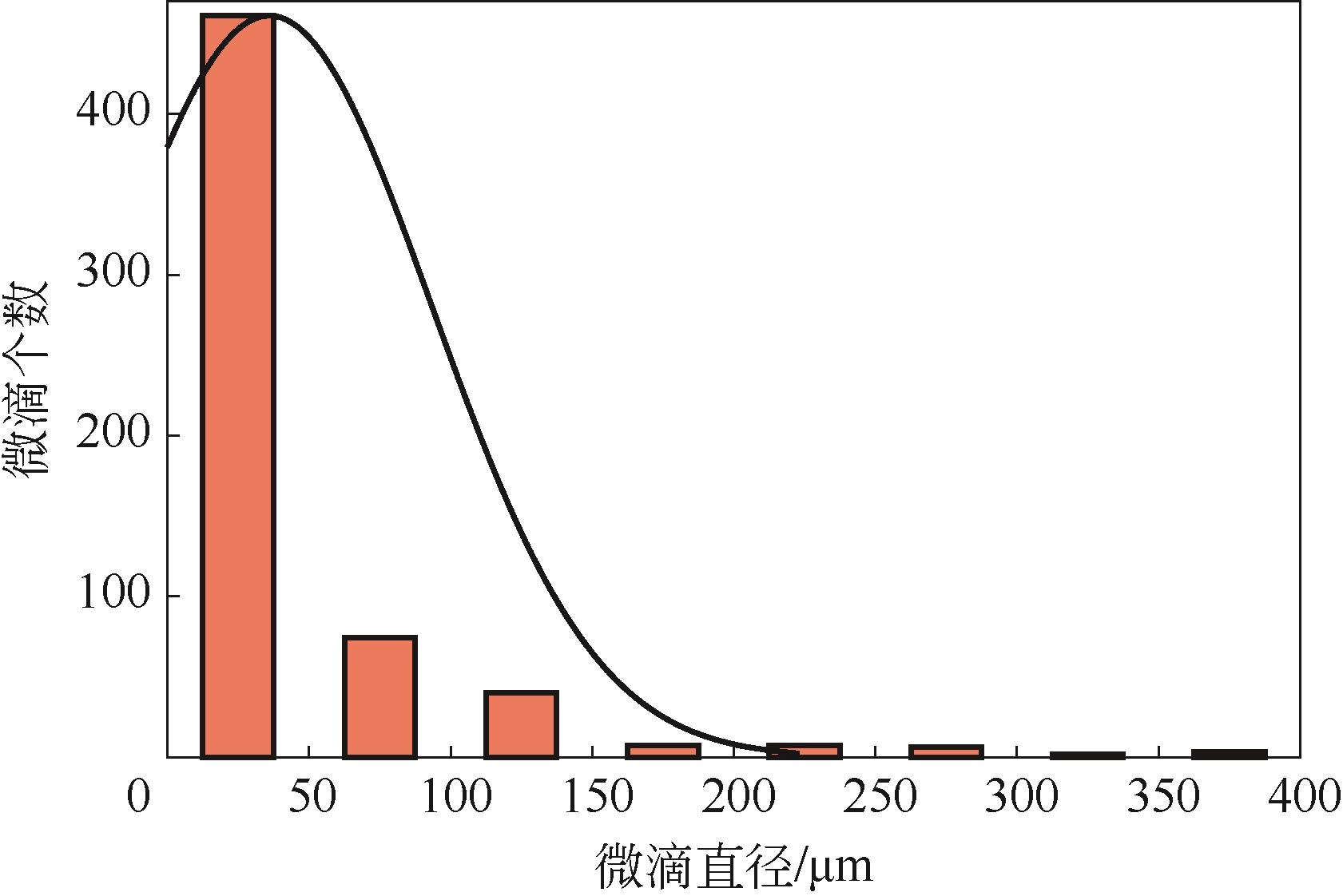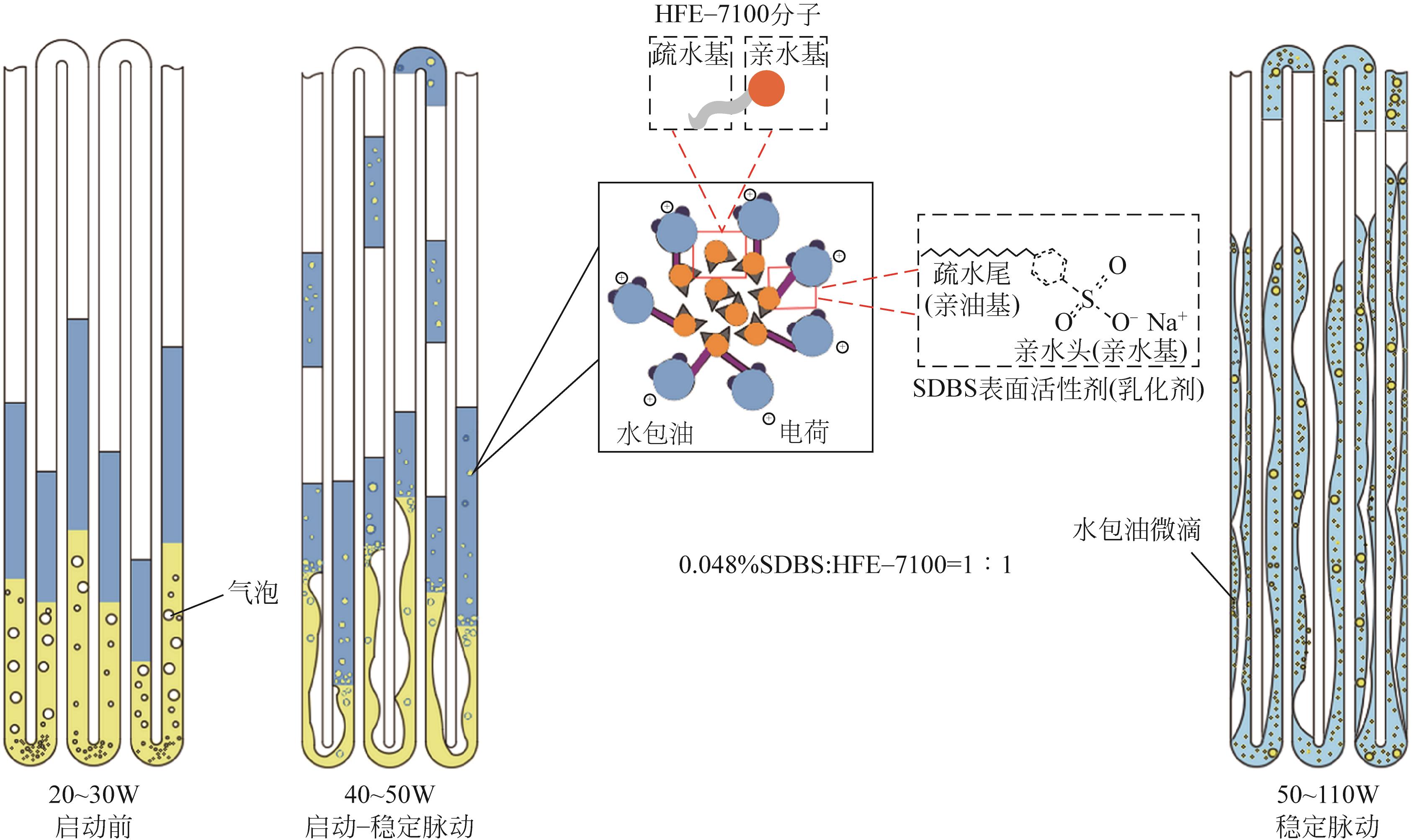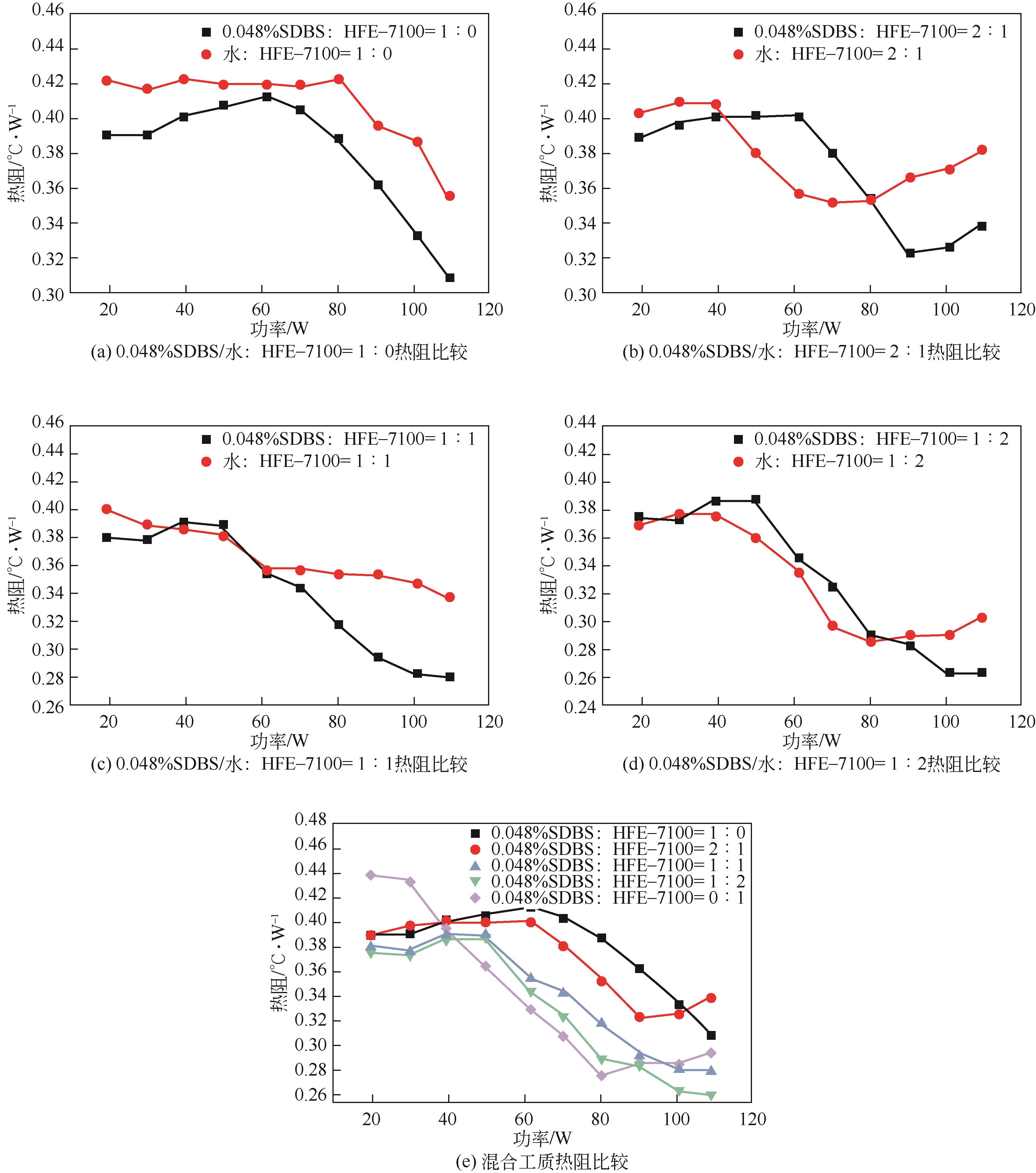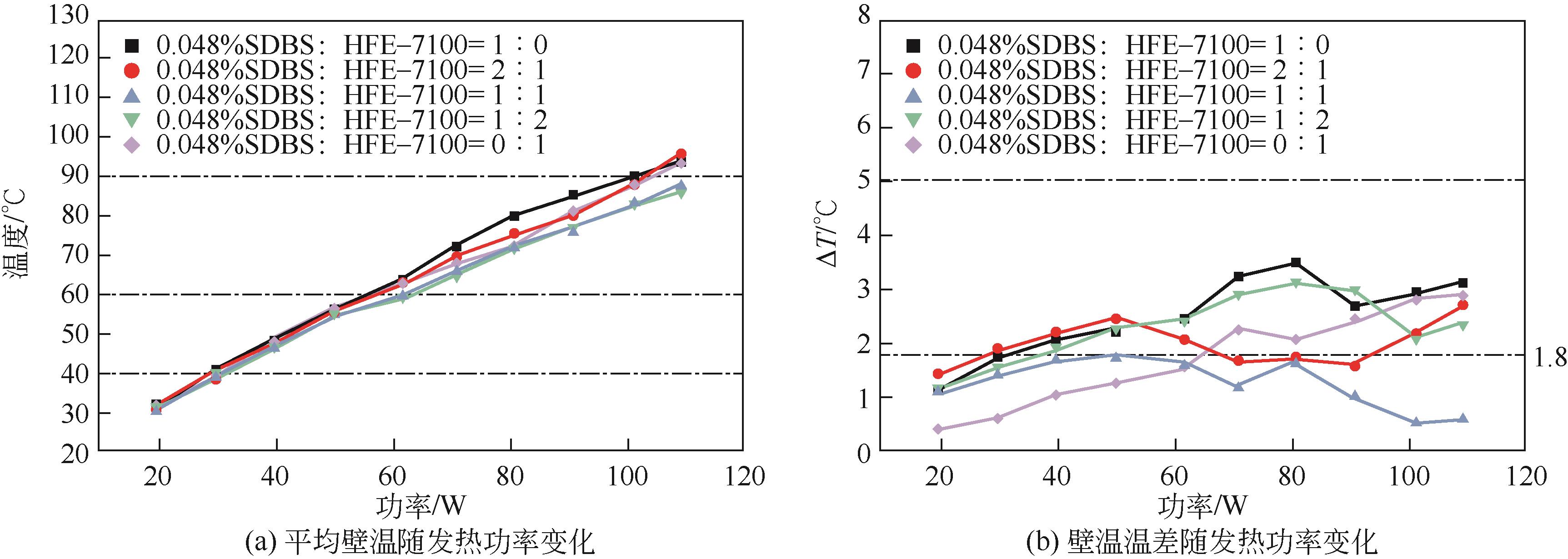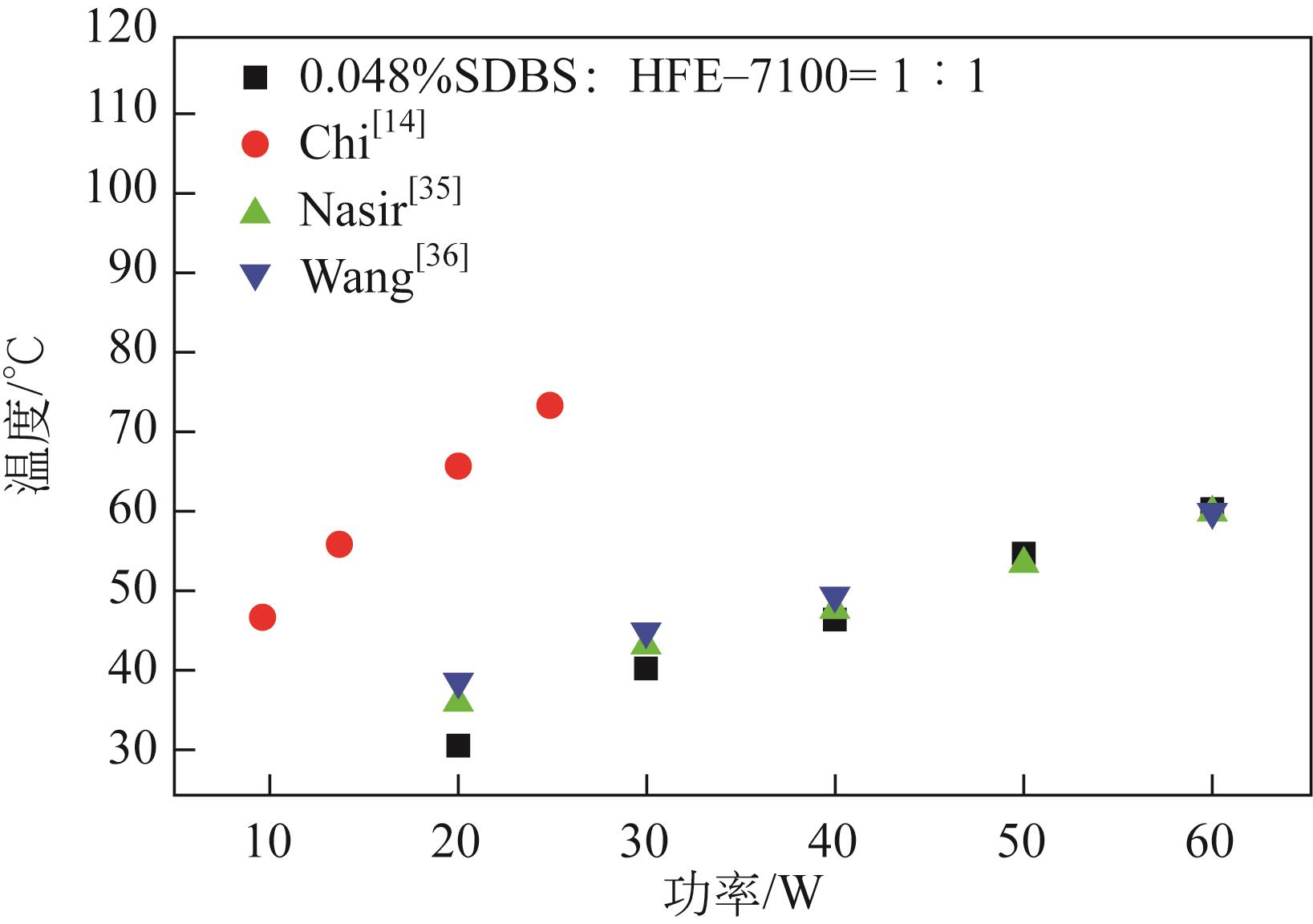Chemical Industry and Engineering Progress ›› 2023, Vol. 42 ›› Issue (3): 1167-1177.DOI: 10.16085/j.issn.1000-6613.2022-0809
• Chemical processes and equipment • Previous Articles Next Articles
Experimental investigation on lithium-ion battery heat dissipation performance of oscillating heat pipe with micro-nano emulsion
GAO Tingting( ), JIANG Zhen, WU Xiaoyi, HAO Tingting(
), JIANG Zhen, WU Xiaoyi, HAO Tingting( ), MA Xuehu, WEN Rongfu
), MA Xuehu, WEN Rongfu
- Institute of Chemical Engineering, Dalian University of Technology, Dalian 116024, Liaoning, China
-
Received:2022-05-05Revised:2022-06-12Online:2023-04-10Published:2023-03-15 -
Contact:HAO Tingting
微乳液脉动热管应用于锂离子电池的散热性能
高婷婷( ), 蒋振, 吴晓毅, 郝婷婷(
), 蒋振, 吴晓毅, 郝婷婷( ), 马学虎, 温荣福
), 马学虎, 温荣福
- 大连理工大学化工学院,辽宁 大连 116024
-
通讯作者:郝婷婷 -
作者简介:高婷婷(1998—),女,硕士研究生,研究方向为脉动热管性能。E-mail:gaotingting5291998@163.com。 -
基金资助:国家自然科学基金(51836002);中央高校基本科研业务费项目(DUT20LAB139)
CLC Number:
Cite this article
GAO Tingting, JIANG Zhen, WU Xiaoyi, HAO Tingting, MA Xuehu, WEN Rongfu. Experimental investigation on lithium-ion battery heat dissipation performance of oscillating heat pipe with micro-nano emulsion[J]. Chemical Industry and Engineering Progress, 2023, 42(3): 1167-1177.
高婷婷, 蒋振, 吴晓毅, 郝婷婷, 马学虎, 温荣福. 微乳液脉动热管应用于锂离子电池的散热性能[J]. 化工进展, 2023, 42(3): 1167-1177.
share this article
Add to citation manager EndNote|Ris|BibTeX
URL: https://hgjz.cip.com.cn/EN/10.16085/j.issn.1000-6613.2022-0809
| 物性 | HFE-7100 | 0.048%SDBS水溶液 |
|---|---|---|
| 沸点/℃ | 61 | 100 |
| 熔点/℃ | -135 | 0 |
| 蒸汽压力/mmHg | 202(25℃) | 760(100℃) |
| 密度/kg·m-3 | 1520 | 1000 |
| 比热容/J·kg-1·K-1 | 1172 | 4125 |
| 表面张力/mN·m-1 | 13.6 | 33.3 |
| 潜热/kJ·kg-1 | 126 | 2256.7 |
| 黏度/Pa·s | 6.383×10-4(20℃) | 1.05×10-3(20℃) |
| 物性 | HFE-7100 | 0.048%SDBS水溶液 |
|---|---|---|
| 沸点/℃ | 61 | 100 |
| 熔点/℃ | -135 | 0 |
| 蒸汽压力/mmHg | 202(25℃) | 760(100℃) |
| 密度/kg·m-3 | 1520 | 1000 |
| 比热容/J·kg-1·K-1 | 1172 | 4125 |
| 表面张力/mN·m-1 | 13.6 | 33.3 |
| 潜热/kJ·kg-1 | 126 | 2256.7 |
| 黏度/Pa·s | 6.383×10-4(20℃) | 1.05×10-3(20℃) |
| 1 | 付畅, 吴亦枫, 章伊宁, 等. 汽车发动机余热采暖系统研究[J]. 节能, 2020, 39(9): 54-57. |
| FU Chang, WU Yifeng, ZHANG Yining, et al. Study on the heating system of vehicle for combustion heat recovery[J]. Energy Conservation, 2020, 39(9): 54-57. | |
| 2 | 翟绍春, 于士博, 李云虹, 等. 可变换热量冷却液温控系统设计与开发[J]. 机电工程技术, 2020, 49(3): 81-83. |
| ZHAI Shaochun, YU Shibo, LI Yunhong, et al. Design and development of the engine coolant temperature control system with variable heat exchange[J]. Mechanical & Electrical Engineering Technology, 2020, 49(3): 81-83. | |
| 3 | PESARAN A, VLAHINOS A, STUART T. Cooling and preheating of batteries in hybrid electric vehicles[C]// The 6th ASME-JSME Thermal Engineering Joint Conference, 2003. |
| 4 | RAMADASS P, HARAN B L, WHITE R, et al. Capacity fade of Sony 18650 cells cycled at elevated temperatures[J]. Journal of Power Sources, 2002, 112(2): 614-620. |
| 5 | 闫啸宇, 周思达, 卢宇, 等. 锂离子电池容量衰退机理与影响因素研究[J/OL]. 北京航空航天大学学报, 2022. DOI:10.13700/j.bh.1001-5965.2021.0458 . |
| YAN Xiaoyu, ZHOU Sida, LU Yu, et al. Research on degradation mechanism and influencing factors on lithium-ion batteries [J]. Journal of Beijing University of Aeronautics and Astro, 2022. DOI: 10.13700/j.bh.1001-5965.2021.0458 . | |
| 6 | BESSELINK I J M, HEREIJGERS J A J, OORSCHOT P F, et al. Evaluation of 20000km driven with a battery electric vehicle[C]// EEVC European Electric Vehicle Congress, 2011. |
| 7 | 邓云. 航空运输锂离子电池热失控多米诺效应研究[D]. 天津: 中国民航大学, 2020. |
| DENG Yun. Study on thermal runaway domino effect of lithium-ion batteries in air transportation[D]. Tianjin: Civil Aviation University of China, 2020. | |
| 8 | 朱晓庆,王震坡, WANG Hsin,等. 锂离子动力电池热失控与安全管理研究综述[J]. 机械工程学报, 2020, 56(14): 91-118. |
| ZHU Xiaoqing, WANG Zhenpo, WANG Hsin, et al. Review of thermal runaway and safety management for lithium-ion traction batteries in electric vehicles[J]. Journal of Mechanical Engineering, 2020, 56(14): 91-118. | |
| 9 | DENG Yuanwang, FENG Changli, Jiaqing E, et al. Effects of different coolants and cooling strategies on the cooling performance of the power lithium-ion battery system: a review[J]. Applied Thermal Engineering, 2018, 142: 10-29. |
| 10 | 吴青平,徐荣吉,王瑞祥,等. 平板回路型脉动热管启动阶段传热特性的试验研究[J]. 制冷与空调, 2020, 20(7): 17-21. |
| WU Qingping, XU Rongji, WANG Ruixiang, et al. An experimental study on operating performance of flat-plate closed-loop pulsating heat pipe in start-up period[J]. Refrigeration and Air-Conditioning, 2020, 20(7): 17-21. | |
| 11 | SWANEPOEL G. Thermal management of hybrid electrical vehicles using heat pipes[D]. Stellenbosch: Department of Mechanical Engineering University of Stellenbosch, 2001. |
| 12 | RAO Zhonghao, HUO Yutao, LIU Xinjian. Experimental study of an OHP-cooled thermal management system for electric vehicle power battery[J]. Experimental Thermal and Fluid Science, 2014, 57: 20-26. |
| 13 | WANG Qingchao, RAO Zhonghao, HUO Yutao, et al. Thermal performance of phase change material/oscillating heat pipe-based battery thermal management system[J]. International Journal of Thermal Sciences, 2016, 102: 9-16. |
| 14 | CHI Riguang, CHUNG Wonsik, Seokho RHI. Thermal characteristics of an oscillating heat pipe cooling system for electric vehicle Li-ion batteries[J]. Energies, 2018, 11(3): 655. |
| 15 | PATEL V M, GAURAV, MEHTA H B. Influence of working fluids on startup mechanism and thermal performance of a closed loop pulsating heat pipe[J]. Applied Thermal Engineering, 2017, 110: 1568-1577. |
| 16 | HAO Tingting, MA Hongbin, MA Xuehu. Heat transfer performance of polytetrafluoroethylene oscillating heat pipe with water, ethanol, and acetone as working fluids[J]. International Journal of Heat and Mass Transfer, 2019, 131: 109-120. |
| 17 | 崔文宇, 蒋振, 郝婷婷, 等. 液态金属微液滴脉动热管的传热性能[J]. 化工进展, 2022, 41(1): 95-103. |
| CUI Wenyu, JIANG Zhen, HAO Tingting, et al. Heat transfer performance of oscillating heat pipe with micro-nano droplets of liquid metal[J]. Chemical Industry and Engineering Progress, 2022, 41(1): 95-103. | |
| 18 | SHI Saiyan, CUI Xiaoyu, HAN Hua, et al. A study of the heat transfer performance of a pulsating heat pipe with ethanol-based mixtures[J]. Applied Thermal Engineering, 2016, 102: 1219-1227. |
| 19 | ZHU Yue, CUI Xiaoyu, HAN Hua, et al. The study on the difference of the start-up and heat-transfer performance of the pulsating heat pipe with water-acetone mixtures[J]. International Journal of Heat & Mass Transfer, 2014, 77: 834-842. |
| 20 | MA H B, WILSON C, BORGMEYER B, et al. Effect of nanofluid on the heat transport capability in an oscillating heat pipe[J]. Applied Physics Letters, 2006, 88(14): 143116. |
| 21 | XU Yanyan, XUE Yanqi, QI Hong, et al. Experimental study on heat transfer performance of pulsating heat pipes with hybrid working fluids[J]. International Journal of Heat and Mass Transfer, 2020, 157: 119727. |
| 22 | 张超. 非共沸混合工质脉动热管流动及传热特性研究[D]. 北京: 北京建筑大学, 2019. |
| ZHANG Chao. Study on flow and heat transfer characteristics of pulsating heat pipe with zeotropic mixtures[D]. Beijing: Beijing University of Civil Engineering and Architecture, 2019. | |
| 23 | XU Rongji, ZHANG Chao, CHEN Hao, et al. Heat transfer performance of pulsating heat pipe with zeotropic immiscible binary mixtures[J]. International Journal of Heat and Mass Transfer, 2019, 137: 31-41. |
| 24 | HAN Z H, YANG B. Thermophysical characteristics of water-in-FC72 nanoemulsion fluids[J]. Applied Physics Letters, 2008, 92(1): 013118. |
| 25 | 屈健, 吴慧英. 水/FC-72纳米乳液振荡热管传热特性研究[J]. 高校化学工程学报, 2012, 26(2): 210-215. |
| QU Jian, WU Huiying. Experimental investigation on the heat transfer performance of a pulsating heat pipe charged with water/FC-72 nanoemulsion fluids[J]. Journal of Chemical Engineering of Chinese Universities, 2012, 26(2): 210-215. | |
| 26 | 董志浩. 聚合物/表面活性剂混合体系对水包油乳液形成和稳定性的影响[D]. 济南: 山东大学, 2017. |
| DONG Zhihao. Synergism of polymer/surfactant mixed system on the formation and stability of the oil-in-water emulsion[D]. Jinan: Shandong University, 2017. | |
| 27 | KHAN M Y, SAMANTA A, OJHA K, et al. Interaction between aqueous solutions of polymer and surfactant and its effect on physicochemical properties[J]. Asia-Pacific Journal of Chemical Engineering, 2008, 3(5): 579-585. |
| 28 | TACHON L, GUIGNARD S. An accurate optical method for the measurement of contact angle and interface shape of evaporative thin liquids films[J]. Experimental Thermal and Fluid Science, 2018, 90: 66-75. |
| 29 | ZHOU Mingzheng, XIA Guodong, LI Jian, et al. Analysis of factors influencing thermal conductivity and viscosity in different kinds of surfactant solutions[J]. Experimental Thermal and Fluid Science, 2012, 36: 22-29. |
| 30 | 张志庆, 王芳, 任超. 电导法与最大压差法测表面活性剂临界胶束浓度实验比较[J]. 实验技术与管理, 2013, 30(1): 44-45. |
| ZHANG Zhiqing, WANG Fang, REN Chao. Experimental comparison of critical micelle concentration of surfactant by conductivity method and max bubble pressure method[J]. Experimental Technology and Management, 2013, 30(1): 44-45. | |
| 31 | 张冉冉, 杜玉兰, 范培浩, 等. 油包水乳化体系稳定性的研究与分析[J]. 日用化学工业, 2020, 50(8): 566-571. |
| ZHANG Ranran, DU Yulan, FAN Peihao, et al. Study and analysis on the stability of water-in-oil emulsions[J]. China Surfactant Detergent & Cosmetics, 2020, 50(8): 566-571. | |
| 32 | 夏纪鼎, 朱震和. 表面活性物基础物理化学 第三讲 表面活性物对乳状液稳定性的影响及其HLB值[J]. 日用化学工业, 1979, 9(4): 52-60. |
| XIA Jiding, ZHU Zhenhe. Basic physical chemistry of surfactants, lecture 3, influence of surfactants on emulsion stability and its HLB value[J]. China Surfactant Detergent & Cosmetics, 1979, 9(4): 52-60. | |
| 33 | FRIBERG S, MANDELL L. Phase equilibria and their influence on the properties of emulsions[J]. Journal of the American Oil Chemists Society, 1970, 47(5): 149-152. |
| 34 | YANG B, HAN Z H. Thermal conductivity enhancement in water-in-FC72 nanoemulsion fluids[J]. Applied Physics Letters, 2006, 88(26): 261914. |
| 35 | NASIR F M, ABDULLAH M Z, ISMAIL M A. Experimental investigation of water-cooled heat pipes in the thermal management of lithium-ion EV batteries[J]. Arabian Journal for Science and Engineering, 2019, 44(9): 7541-7552. |
| 36 | WANG Q, JIANG B, XUE Q F, et al. Experimental investigation on EV battery cooling and heating by heat pipes[J]. Applied Thermal Engineering, 2015, 88: 54-60. |
| [1] | ZHAO Jian, ZHUO Zewen, DONG Hang, GAO Wenjian. A new method for observation of microstructure of waxy crude oil and its emulsion system [J]. Chemical Industry and Engineering Progress, 2023, 42(8): 4372-4384. |
| [2] | WU Ya, ZHAO Dan, FANG Rongmiao, LI Jingyao, CHANG Nana, DU Chunbao, WANG Wenzhen, SHI Jun. Research progress on highly efficient demulsifiers for complex crude oil emulsions and their applications [J]. Chemical Industry and Engineering Progress, 2023, 42(8): 4398-4413. |
| [3] | YANG Yang, SUN Zhigao, LI Cuimin, LI Juan, HUANG Haifeng. Promotion on the formation of HCFC-141b hydrate under static conditions by surfactant OP-13 [J]. Chemical Industry and Engineering Progress, 2023, 42(6): 2854-2859. |
| [4] | GUO Wenjie, ZHAI Yuling, CHEN Wenzhe, SHEN Xin, XING Ming. Analysis of convective heat transfer and thermo-economic performance of Al2O3-CuO/water hybrid nanofluids [J]. Chemical Industry and Engineering Progress, 2023, 42(5): 2315-2324. |
| [5] | WANG Wei, ZHANG Dongxu, LI Zunzhao, WANG Xiaolin, HUANG Qiyu. Research progress on the growth behavior of hydrates in water-in-oil emulsion systems [J]. Chemical Industry and Engineering Progress, 2023, 42(3): 1155-1166. |
| [6] | ZHANG Hua, LIU Guangquan, ZHANG Xiaofei, LUO Zhen. Stability analysis and demulsification treatment for desalter effluent [J]. Chemical Industry and Engineering Progress, 2022, 41(9): 5047-5054. |
| [7] | ZHANG Xincheng, HE Lin, SUI Hong, LI Xingang. Demulsification process and enhancement by viscosity reduction for water-in-heavy oil emulsions [J]. Chemical Industry and Engineering Progress, 2022, 41(7): 3534-3544. |
| [8] | CHANG Wei, SHI Qiulan, ZHAO Zhengyang, WANG Ruiting, WANG Zhifu, ZHAO Jianbo. Preparation and application of polyacrylamide porous hydrogel by high internal phase emulsion polymerization [J]. Chemical Industry and Engineering Progress, 2022, 41(7): 3832-3839. |
| [9] | HU Yaoyao, WEI Ming, LI Boshen, DONG Yuelin, DONG Qunfeng, LIU Chuanqi. Preparation and properties of silicon and sulfhydryl compound modified UV-curable WPUA coating [J]. Chemical Industry and Engineering Progress, 2022, 41(6): 3186-3193. |
| [10] | GONG Xin, LIU Xiaodong, WEN Fushan, SHI Nan, LIU Dong. Preparation and electrochemical performance of mesocarbon microbeads derived from emulsion-polymerization method [J]. Chemical Industry and Engineering Progress, 2022, 41(5): 2379-2388. |
| [11] | LU Shaofeng, CUI Shanshan, SHI Wenzhao, LI Susong, XIE Yan, YANG Qiancheng. Preparation and properties of cross-linked waterborne polyurethane solid-solid phase change material [J]. Chemical Industry and Engineering Progress, 2022, 41(5): 2574-2581. |
| [12] | LU Zhaojin, REN Guanwei, LYU Fuwei, DONG Xiao, BAI Zhishan. Development and application of deacidification technology in domestic sulfuric acid alkylation refining system [J]. Chemical Industry and Engineering Progress, 2022, 41(3): 1430-1439. |
| [13] | LUO Mingyun, LING Ziye, FANG Xiaoming, ZHANG Zhengguo. Research progress of battery thermal management system based on phase change heat storage technology [J]. Chemical Industry and Engineering Progress, 2022, 41(3): 1594-1607. |
| [14] | SHAN Linna, YANG Zhensheng, YAN Guofei, LI Chunli, LI Hao, WANG Zhiying. Asymmetric Janus membranes based on hydrophilic modification of dopamine for efficient oil/water separation [J]. Chemical Industry and Engineering Progress, 2022, 41(12): 6500-6510. |
| [15] | XU Ruixue, CHENG Fengru, MA Jing, DENG Yufeng, ZHAO Jianbo. Polyacrylamide porous microspheres prepared by multiple Pickering emulsions method and its application [J]. Chemical Industry and Engineering Progress, 2022, 41(12): 6549-6556. |
| Viewed | ||||||
|
Full text |
|
|||||
|
Abstract |
|
|||||



